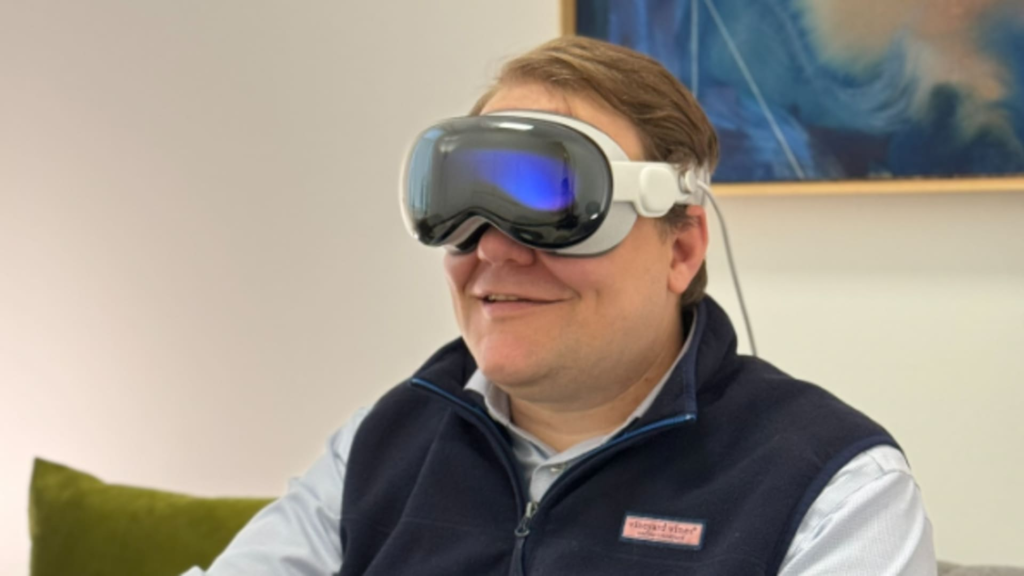S
It’s night. I’m at a lake near Oregon’s Mount Hood, sitting on the beach. Jazz music is playing as I write. I’m not in the real world.
Well, I sort of am.
I’m wearing Apple’s new Vision Pro headset, which looks like a fancy pair of glowing ski goggles.
Apple’s long-awaited headset, which starts at $3,500, launches in the U.S. on Friday. It’s the company’s first major new gadget to hit the market since the Apple Watch debuted in April 2015. I’ve been testing it for nearly a week. While it has some shortcomings, it’s easily the most fun new product I’ve tried out in years.
Analysts don’t expect the Vision Pro to drive massive amounts of revenue initially. UBS anticipates Apple will ship about 400,000 headsets, leading to a “relatively immaterial” $1.4 billion in revenue this year. However, I’m convinced that if Apple eventually sells cheaper versions, we’ll see millions of people using them in the coming years.
The Vision Pro offers a new kind of experience that Apple calls “spatial computing.” You sit in your world while looking at a digital one, and then plop different apps around you. You can work, play games, watch movies or surf the web.
Thanks to very sharp displays, and a full M2 processor that’s usually found in Macs, the Vision Pro has the power to do a lot of what you’d expect from an Apple device. There’s a dedicated App Store for Vision Pro apps, but you can also install more than a million iPhone or iPad apps. Or pair it with your Mac and work while looking at a 4K display inside the goggles.
I’m only scratching the surface of the capabilities, but here’s the gist: This is an entirely new type of computing, providing a whole new world of experiences. It feels like the future.
Here’s what you need to know:
What’s good
I was skeptical when I first met with Apple to see the Vision Pro. Companies have been trying to do virtual reality and augmented reality and mixed reality or gobbledygook reality for years.
Sometimes it’s cool, but most of the time I’m done after an hour or so.
With the Vision Pro, there are three key parts that come into play. It has super sharp and colorful screens, it allows you to see the world around you by default using “passthrough” technology, and it has a fast processor.
The displays help remove the “screendoor” effect that’s common in lower-cost headsets like the Meta Quest 3. That’s where you can see the pixels as you look through a headset. You can easily read text on a website or a book on the Vision Pro. And I was able to watch movies, including in 3D, on screens bigger and nicer than any TV in my house.
The Quest 3 and other headsets also have passthrough. But Apple’s works better. It’s clearer and sharper, enough so that I can comfortably see the room around me in full color and without any lag, though I still can’t read my phone. And I love how you can turn the small digital crown, just like on the Apple Watch or AirPods Max, to adjust the volume or transport yourself into a fully 3D landscape.
Virtual travel is a nice touch. You can work or watch movies in Hawaii, by a lake, in White Sands or at Joshua Tree. They’re all relaxing environments with calming sounds and slow animations – like clouds moving across the sky — that help you feel like you’re almost there.
Navigation is easy once you get the hang of it. This reminds me a bit of the iPhone moment, when Apple launched its multitouch display that changed how we interact with phones that had largely been navigated with a stylus, touchpad or keyboard. There aren’t any controllers here. The headset uses sensors to track your eyes (and even verify when you’re making purchases online or in the App Store.) Apple has a quick setup process that aligns the headset to your eyes and then has you look at a series of dots, pinching your fingers as you go so you can calibrate. If you wear glasses, Apple also sells inserts that pop into the headset.
It’s incredibly accurate. You just look where you want to go and then tap your thumb and index finger to select a button or app. There’s a white bar at the bottom of every app, for example, that you can grab to pull and push around. You can adjust the size of any app by looking at the corner and then dragging it out or in at a diagonal angle. And you can swipe through photos or scroll websites by holding your index finger and thumb together while pulling up or down.
Likewise, you zoom in and out by holding those fingers on both hands and pulling outward or inward. You don’t have to flail your hands in front of you. The headset’s external cameras can detect your fingers down in your lap. You can be subtle.
It packs a punch.
I launched more than a dozen apps around me. There’s no point in doing more, because you can’t see it all. I loved setting it up with a browser in front of me, music next to me and a TV screen above it all. But the world is yours to customize. You can open mail and a browser or leave Slack open next to a Word document with your calendar on the other side. Put your text messages on the ceiling if you want. It’s a completely new way to multitask.
A note: My screenshots show apps askew. But, in the headset, they’re all perfectly level.
I didn’t run into any slowdowns during my time with the Vision Pro. Part of that is due to how Apple renders content. It’s technically only sharpening the areas of the screen where you’re focusing, leaving the other areas blurry. That’s why some of the screenshots here look out of focus around the sides. Inside the headset, it’s all super crisp. It’s called foveated rendering, and it allows for optimized processing.
I loved watching movies with the headset. I lounged on my couch and put up a huge screen across the wall of my living room and watched an hour of “Barbie,” and the two first episodes of “Masters of the Air” before the battery was at about 5%. Another night I watched “Greyhound.” I used the NBA app, which was updated to work on the Vision Pro, to stream four games at once, with the main game in the middle and others pinned to the sides. It’s wild.
Apple also has some specially recorded content that’s so sharp you feel like you’re standing right there next to a rendered dinosaur or a video of a rhinoceros. There’s a slightly terrifying clip with a woman walking on a tightrope between cliffs. Don’t watch if you’re afraid of heights. The clips show the type of content third parties will eventually be able record and publish to the headset. I imagine sports highlights or even sitting courtside at a live game.
The Disney+ app is fun. You can watch movies in one of about four different 3D landscapes. I sat in a racer on Tatooine and watched a bit of a Star Wars movie, but then switched over to watch “Spider-Man: Into the Spider-verse” in 3D. Unlike 3D TVs and movies, which generally flopped, the effects work well in the headset. It’s neat, but I still prefer watching movies in 2D. It feels more natural to me.
FaceTime works well. You see a clear video of the person you’re calling on a screen in front of you. But they don’t see you. Or, not the real you. They see a 3D-rendered version of you called a digital Persona. It’s still in beta, and mine looked like a much older version of me. My colleague thought I looked like an 80-year-old man. My wife laughed.
You create a Persona by selecting an option in the settings menu and then removing the headset and following screens on the external display. It asks you to look up, look down, look left, look right, smile, smile with teeth, and close your eyes. Then, in seconds, it creates a 3D Persona.
It looks more human than cartoony like with other headsets. I spoke with people over FaceTime also using Personas, and it’s much easier to hold a conversation without feeling like you’re two goofy avatars trying to talk. You can hold a real meeting if necessary in your pajamas while your Persona is in work attire. Personas also carry over to other apps like WebEx.
Your Persona’s eyes can appear on the outside display. Someone will see glowing effects on the outside of the headset if you have screens up in front of you. If they begin talking to you and you’re in an immersive view – like one of the landscapes I mentioned earlier – they’ll start to fade into focus so you can see them. As you look at them, the eyes of your digital Persona become visible on the outside of the headset. It looks like you’re wearing a snorkeling mask.
In real life, I just removed the headset face when my wife came in to chat.
The built-in speakers are great. They get nice and loud and support spatial audio, so if you turn your head away from the movie in front of you, the sound stays in the same place, much like if you were watching a real TV. Music and movies sounded fantastic, with full surround sound. People can hear the audio coming out of the headset, though, so you’ll want to use AirPods in public.
I love the “spatial photos” you can capture using the cameras on the outside of the Vision Pro or with the latest iPhone 15 Pro and iPhone 15 Pro Max. The camera creates a 3D version of a photo or video. I filmed my 4-month-old daughter eating and my dog’s 9th birthday, for example, in hopes that I’ll be able to come back and relive some of those moments. I wish I had recorded some of these videos when my stepfather was alive because it’d feel like he was in the room with me. Some people might see it as a gimmick, but I found it moving.
Lastly, the build quality is superb. Apple used top-of-the-line glass, screens and metals. It feels like a premium headset and it’s comfortable to wear. My only complaint is that I had to be deliberate to hold it by the metal frame. The padded inserts pop off their magnets if you try to grab them. Those could be stronger, but they were designed to be easily removed so people could share the headset by popping in their own inserts.
What’s bad
Apple’s apps work well. You’ll find Notes, Music, Safari, Podcasts, Photos, Apple TV+, Maps and more. Other apps include SkyGuide and Disney+ and there are Apple Arcade games. Many more are coming, as most apps haven’t yet been built specifically for Vision Pro.
The Vision Pro supports more than a million iPhone and iPad apps. But you need to search for each app individually and some of them aren’t available. Netflix and Spotify haven’t been shy about not supporting the Vision Pro, though you can easily access either using the browser. Still, there are lots of others that I couldn’t find: 1Password isn’t there, which made logging into some apps a bit of a pain. You won’t find Uber, DoorDash (but there’s GrubHub!) or Amazon. None of Google’s apps are here, including YouTube TV, though it works fine in the browser.
Popular games like Diablo Immortal and Genshin Impact aren’t available. Facebook’s apps aren’t here, so no Instagram. These are just a few I noticed.
Some work well, though. I didn’t have any issues with the X iPad app, for example. CNBC’s app worked fine. Others, like Amazon Prime Video, exist but aren’t great. A bug shows a big box in the middle of the screen when you’re watching a movie, but a fix is coming.
For some apps that aren’t yet available, developers are working to optimize them and eliminate bugs.
Apple Keychain was sometimes buggy in iPad apps. This is Apple’s version of 1Password, and I rely on it to enter my username and passwords. It generally works fine. But if you have two usernames for apps, like my wife and I do for Amazon Prime Video or Peacock, the app locks up when you try to select a different login. I informed Apple of the bug.
The floating keyboard is useful for search or typing quick messages, but you won’t be able to type very fast at first. You look at each letter on a digital keyboard and select it, or reach out and tap the digital keyboard. I got faster during my time with the Vision Pro, but nowhere near as quick as I am on my iPhone or a real keyboard. You can just use Siri voice-to-text to respond to iMessages or enter URLs in the browser (and launch apps). Still, you’re going to want to use a keyboard if you have to do a lot of typing.
There’s also the battery pack that plugs into the headset with a proprietary plug that you twist in. I don’t mind it. I thought the pack worked fine, but it would be a lot easier if it was just embedded into the headset, though that would add weight.
Should you buy it?
I’d buy the Vision Pro right now if I had an extra $3,500. I’d even consider trading in my iPad Pro and MacBook Pro to offset the cost since the headset gives me a lot of the same capabilities. But that’s not an option.
You’ll definitely love it for movies. I think a lot of people will also really enjoy being able to read the news and browse the web while having a huge TV screen open and lounging on their couch. Some may find they can work in it. I did. It’s fun.
Apple’s real opportunity will materialize when it finds a way to mass produce the Vision Pro at closer to $2,000, or less. Until then, it may be a niche product. But the experience blows everything else out of the water. It’s Apple’s most exciting product in years and it’s the best example yet that this will become a new way of computing.
Don’t miss these stories from CNBC PRO:
Read the full article here












